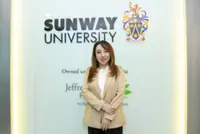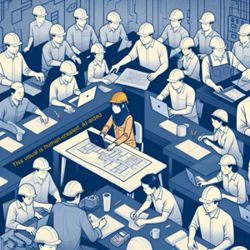
One for the album: (First row, from left) Prof Lee, Prof Ewe, Liow, Yang, Law, Chan, Eastern Steel Group executive director Tee Choon Hock, and (back row, first and second from left) Yap and Wong with members of the delegation at the reception.
A DELEGATION from the University of Science and Technology Beijing (USTB) in China recently embarked on a mission to Malaysia, fostering collaboration between the two nations.
Led by its president Prof Yang Ren Shu, the delegation explored opportunities for partnership with prominent Malaysian establishments and institutions, including Eastern Steel Group, Universiti Tunku Abdul Rahman (UTAR), and Tunku Abdul Rahman University of Management and Technology (TAR UMT).
TAR UMT board of governors member Wong Cheng Siung said USTB showed great interest in the international industry-education collaboration with Eastern Steel Group.
“This is a project where Chinese universities actively engage in overseas joint ventures to cultivate talent.
“Both sides also actively discussed collaboration opportunities with TAR UMT, aiming to establish comprehensive cooperation in fields such as establishing USTB’s International College overseas, international talent development and technological innovation.
“In addition, USTB signed a memorandum of understanding (MoU) for cooperation with UTAR, where both parties will engage in productive cooperation in joint research projects, faculty visits, student exchange programmes, academic activities and others.
“UTAR hopes to expand and diversify their collaboration beyond the existing foundation,” he said during a reception hosted by Eastern Steel Group director Tan Sri David Law for the delegation in Kuala Lumpur on Oct 17.
Those present included representatives from the varsities, such as UTAR president Prof Datuk Dr Ewe Hong Tat and UTAR Lee Kong Chian Faculty of Engineering and Science dean Assoc Prof Dr Yap Wun She; as well as TAR UMT alumni council chairman and board of governors member Tan Sri Chan Kong Choy,
TAR UMT board of governors chairman Tan Sri Liow Tiong Lai, and TAR UMT president Prof Dr Lee Sze Wei.
Wong said Eastern Steel Group, a joint venture between Hiap Teck Venture Berhad and Beijing Jianlong Group of China, wanted to localise its employees as one of the group’s talent strategic goals.
“The group currently has an annual production capacity of 2.7 million tonnes of steel slabs and billets. It plans to expand into a large-scale, modern integrated steel enterprise with a capacity of five million tonnes.
“It is keen to provide learning opportunities, good remuneration and career development prospects for young Malaysian students who are eager to learn and advance their careers,” he said.
USTB, on the other hand, is a prestigious Chinese university focusing on engineering, and the coordinated development of disciplines in engineering, science, management, humanities, economics and law, said Wong.
“Over the past 70 years, USTB has produced more than 300,000 talents in various fields, and its metallurgical engineering discipline has consistently ranked first in the ‘Academic Ranking of World Universities’ in recent years, making it a world-class institution.”
Wong noted that both Eastern Steel Group and USTB have had multiple visits and discussions about the plan to jointly cultivate metallurgical professionals in local universities in Malaysia. “Ultimately, they signed an agreement for international talent joint education with TAR UMT in June this year.
“According to the agreement, Malaysian secondary school graduates will study for two years at TAR UMT before furthering their studies at USTB.
“Upon graduation, students will receive a university degree, which is recognised by our Higher Education Ministry and China’s Ministry of Education,” he said.
Wong added that Eastern Steel Group will provide scholarships and living expenses support for selected students to help them successfully complete their studies and prepare for their future careers.
“Eastern Steel Group will provide 150 service-based scholarships, covering majors in metallurgy (60), mechanical manufacturing (30), electronic information automation (30) and finance (30).
“When students graduate, they will have direct employment opportunities.
“We encourage students who require financial assistance to apply actively to this talent development programme tailored by universities for the talent needs of Eastern Steel Group in Malaysia,” he said.
Separately, Prof Ewe said UTAR’s signing of the MoU with USTB on Oct 17 not only represents the connection between the two universities, but also symbolises their shared vision, which is to collaborate in nurturing global future leaders and addressing global challenges together.
“I believe that through international cooperation, we can promote the exchange of science and culture, and foster peace and prosperity,” he said in a press release.
Yang said in recent years, USTB has put forward an international school philosophy in cultivating teachers and students, encouraging students to study abroad and guiding foreign students to study in China.
“We also hope our teachers can go abroad for academic exchanges.
This MoU will be an opportunity for UTAR students to study our distinctive academic majors at USTB and our students to study abroad at UTAR,” he said.











































